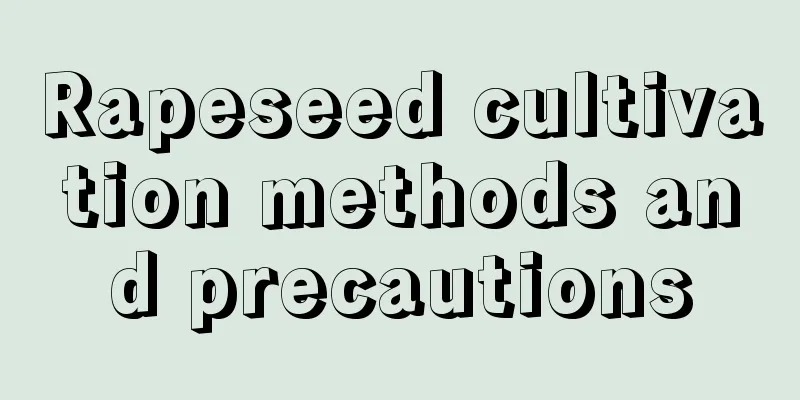Rapeseed cultivation methods and precautions

1. Maintenance methods1. Temperature: It is heat-resistant but not cold-resistant, so it is not suitable for planting in the north. Most of its distribution areas are in the southwest. The maintenance temperature must be kept above 20 degrees so that it can grow normally. 2. Watering: It likes moisture, especially during the development period, it needs a lot of water. When the temperature is relatively high, it needs to be watered once every two days. When the temperature is relatively low, it needs to be watered two to three times a week. After the results, watering should be controlled in order to promote the growth of fruit pods. 3. Fertilization: It consumes nutrients relatively quickly, especially during the growing season. In addition to the base fertilizer used in the soil before planting, fertilization is required three to four times during the entire growing period. The fertilizer used should be a fertilizer with a relatively comprehensive fertilizer effect. Human and animal manure and urine can also be used. When fertilizing, be careful that the fertilizer cannot directly contact the plant body, otherwise the plant will be burned. 4. Light: It is a long-day plant and has a very high demand for light. It can receive full-day sunlight. If it is a potted plant, it is best to place it in a sunny place and ensure that the daily sunlight time is more than six hours. 2. Breeding techniques1. Reproduction: Rapeseed can be propagated by sowing. Because the seeds are relatively low and have a low germination rate, you need to choose a higher quality culture medium and adjust the maintenance environment to increase the germination rate. If you sow in the open field, the row spacing should be controlled at about 20 centimeters. After sowing, cover them with a centimeter thick layer of fine soil and water them thoroughly. They will germinate in about a week. 2. Repotting: If you keep the plant at home, you need to repot it every year. When repotting, you need to trim off the rotten and dry roots, and use soil with good drainage and sufficient nutrients. 3. Problem Diagnosis1. Pests: Rapeseed is more susceptible to aphids. Aphids will attach to the top of each branch and eat the tender leaves of the plant, which will affect the health of the plant. At this time, it is necessary to use omethoate to spray it for treatment. 2. Diseases: Rapeseed is more susceptible to sclerotinia disease during the flowering and fruiting stages. After infection, the leaves of the plant will turn yellow, which will directly affect the yield. During daily maintenance, prevention and control must be done well. You can use dimethoate emulsion to soak and spray for prevention. IV. Other issues1. Edibility: It is edible and rapeseed can be used to extract oil. 2. Toxicity: non-toxic. |
<<: Xiuyan's breeding methods and precautions
>>: Breeding methods and precautions of Zhaoshanbai
Recommend
What diseases does Benomyl mainly treat?
Benomyl is a highly effective, low-toxic, broad-s...
What is the row spacing for planting chrysanthemums?
1. What is the row spacing? When planting chrysan...
When is the best time to grow celery seedlings (celery sowing and seedling raising methods and planting time)
Celery is a general term, why? Because there are ...
What medicinal herbs are best grown in Sichuan? What precious Chinese medicinal herbs are produced in Sichuan?
Sichuan is a place rich in Chinese medicinal mate...
What is the best month to plant blueberries?
When it comes to fruits that protect the eyes, th...
Is it profitable to grow purslane? How much profit can one acre of plantation make?
Is it profitable to grow purslane? Purslane is al...
The meaning and symbolism of peony flowers
1. Meaning 1. Meaning: Peony has rich colors and ...
Is the colorful spider plant poisonous?
Is it toxic? Although this plant is purple, it do...
How to grow radish
1. Sunlight For growing radish, you can provide a...
The efficacy and function of Melaleuca alternifolia
one. Practical value 1. The main component of tea...
How to grow Andrographis paniculata
1. Maintenance conditions 1. Soil requirements: A...
What's wrong with the bear's paw dropping leaves? Can it be planted with the dropped leaves?
1. Why does Bear's Paw drop its leaves? 1. Th...
How to grow goldfish spider plants until they overflow the pot
1. Adequate sunlight If you want the goldfish pla...
What is the meaning of white roses
1. Flower Language 1. Innocence: The white rose l...
Can dry leaves be used as fertilizer?
Dried leaves as fertilizer Dry leaves can be used...









